If you wish to work as a caregiver taking care of a disabled or ill person, free online caregiver courses with Certificates will be useful to you. These courses are good resources for caregivers to help them better understand the needs of the disabled persons under their care or patients and develop a good relationship with them.
Table of Contents
In an ever-evolving world, the demand for trained caregivers is increasing. Many people show a desire to enter the caregiving profession by completing caregiver courses. Online caregiver courses give you the opportunity to gain valuable knowledge on care services.
Explore the best free online caregiver courses with Certificates that provide personal and professional development opportunities in the caregiving field.
Key Takeaways
- You can learn valuable skills to care for people who are sick or old.
- There are many free online courses available.
- These courses cover a wide range of topics, including how to bathe and dress someone, how to give medication, and how to deal with emergencies.
- Completing a course can help you get a job as a caregiver.
- Caregiver jobs can be in hospitals, nursing homes, or people’s homes.
10 Best Free Online Caregiver Courses With Certificates
| Course Name | Description | Provider |
| Understanding Dementia | Learn about dementia & how to care for patients | Varies |
| Mental Health & Resiliency in Aged Care Facilities | Become more resilient & aware of mental health issues | EdApp |
| First Aid Training and Standards | Learn CPR & first aid | Varies |
| Mealtime Management | Manage mealtimes to ensure patients’ health | Varies |
| Introduction to Safe Patient Handling | Learn how to safely lift and move patients | Varies |
| Sepsis Awareness | Recognize sepsis symptoms & support patients | EdApp |
| Hazard Communication (for Healthcare) | Learn about hazardous substances & safety protocols | EdApp |
| Medication Management by EdApp | Medication management for caregivers | EdApp |
| The Hows of Hand Hygiene by EdApp | Handwashing techniques for caregivers | EdApp |
| Alzheimer’s Disease & Dementia Care | Learn about dementia & dementia care | edX |
1. Understanding Dementia
This is one of the best free online caregiver courses with certificates that educate you about dementia and how it affects people’s lives. The course also covers how to interact with patients, how to care for someone with dementia, and how to provide effective care at different stages of dementia.
If you complete this course, you will be able to provide better care to dementia patients – who are already struggling to live a normal life. You will improve your knowledge thanks to the gamification and microlearning techniques used in this free online caregiver course.
2. Mental Health & Resiliency in Aged Care Facilities
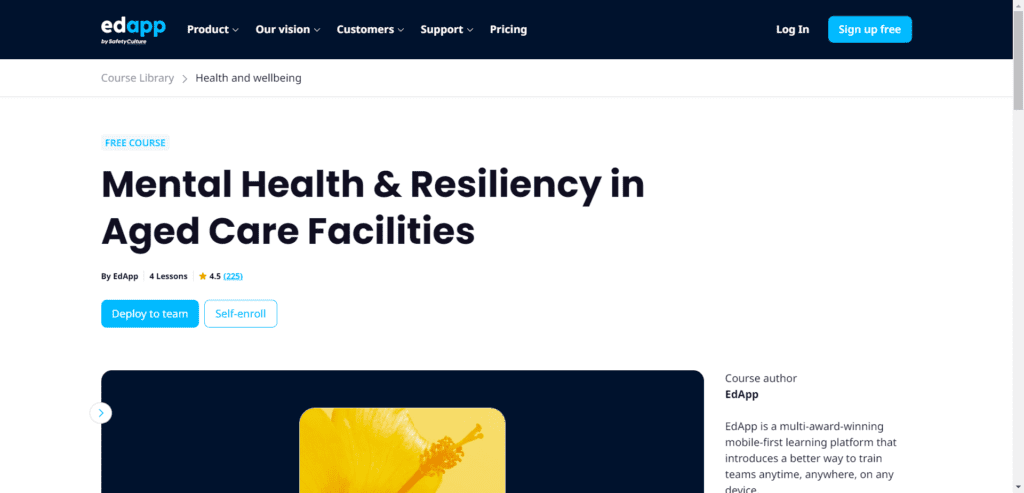
This free microlearning course can help caregivers become more resilient to emotions and aware of mental health issues. The 3R’s paradigm of resistance, mental health issues, resilience, etc., are all covered in this online caregiver course. The course ends by providing a list of several mental health hotlines in the US, UK, and Australia.
This free online caregiver courses with certificates are easier to follow than most online courses due to EdApp’s user-friendly micro-learning methodology. Large informational blocks are divided into smaller parts by microlearning.
3. First Aid Training and Standards
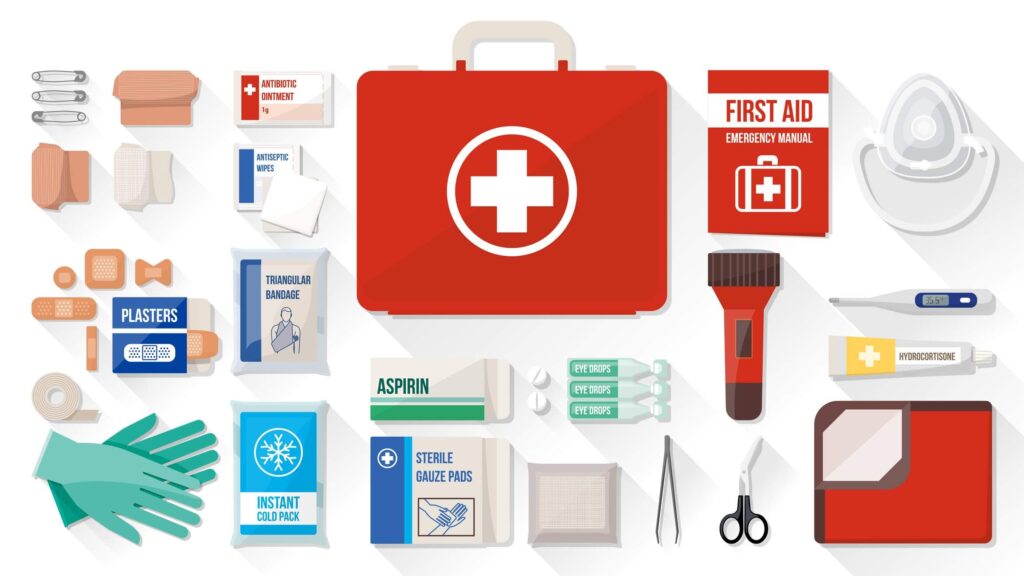
This caregiver course teaches you the importance of first aid. With free online caregiver courses with certificates, you will learn how to follow OSHA safety rules and related solutions. Since caregivers will be the first to help if something happens to the patient, this caregiving training is important for them.
This online caregiver course covers the OSHA First Aid standard, which mandates that first aiders in the workplace must always be prepared in case emergency medical aid is not available.
4. Mealtime Management

Managing mealtimes is essential to ensure the health of your patients. Inadequate food management by caregivers may hinder patients’ recovery. This free online course for caregivers covers the foundations of healthy eating and mealtime management for patients with dysphagia.
This free online course with certificates outlines the importance of managing mealtimes, as well as the actions careers can take to enhance their current approach. Once you have completed this course and put what you have learned into practice, you will see improvements in your patients.
5. Introduction to Safe Patient Handling
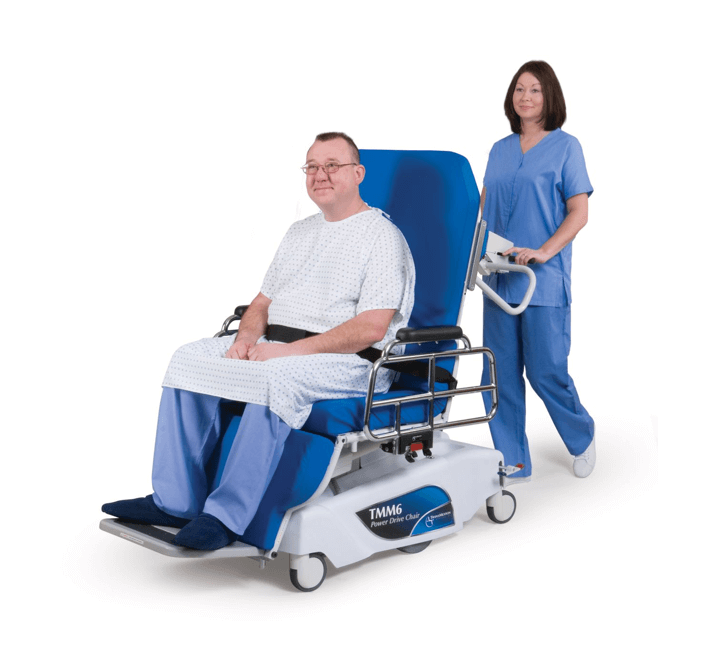
Discover the benefits of free online caregiver courses with certificates as you learn how to reduce workplace accidents while increasing the quality of patient care.
In this course, caregivers will experience three short lessons that will provide them with a general understanding of the benefits of safe patient management, ways to detect patients’ health risks, and how to correctly lift and move patients. The methods described can be applied in a variety of situations.
6. Sepsis Awareness
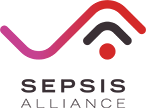
The Sepsis Awareness course on EdApp explains what sepsis is and how to recognize symptoms in patients. It will show caregivers what steps to take once they know their patient has sepsis and how to best support them.
The final two sessions of this free online caregiver courses with certificates focus on post-sepsis treatment and what to keep in mind during recovery. After completing the course, you will be able to support your patients effectively and prevent sepsis from getting worse.
7. Hazard Communication (for Healthcare)
Hazard Communication by EdApp was created to give students the skills and information they need to stay informed and avoid illnesses and injuries. The techniques caregivers should use at work are outlined in this caregiver course along with present risk communication requirements.
Join free online caregiver courses with certificates. You’ll learn to read safety data sheets and chemical labels effectively, making you safer when dealing with hazardous substances.
8. Medication Management by EdApp
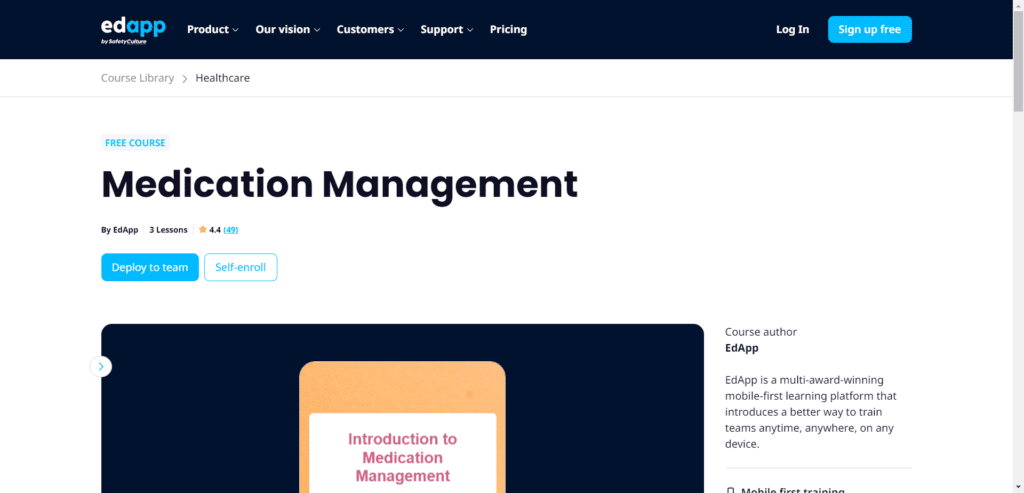
EdApp’s medication management curriculum, available in the free online caregiver courses with certificates, delivers comprehensive education on this topic. It encompasses the significance of medication management, practical tips and procedures for caregivers, and ensuring correct medication administration.
In the course, students will learn how to handle challenging patients and how to recognize signs that a patient’s medication is not working. The training also covers proper storage and waste management to prevent caregivers from accidentally spoiling important medications or putting others at risk.
9. The Hows of Hand Hygiene by EdApp
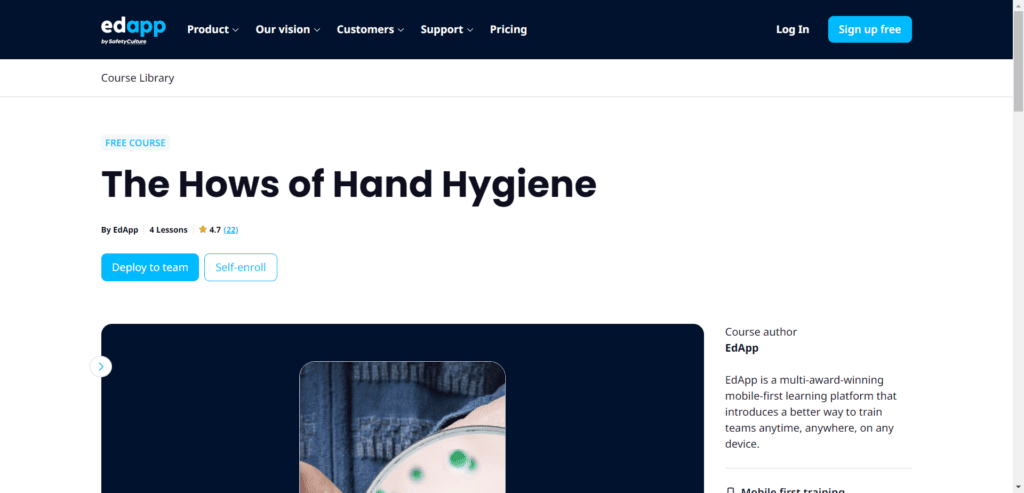
This caregiver training will teach you the fundamentals of good hand hygiene. This includes how hands are the main entry point for germs, how to keep your hands clean while working, and how to practice hand hygiene after work. Understanding these topics in this free online caregiver courses with certificates will help you promote cleaner work environments and higher standards of patient care.
10. Alzheimer’s Disease & Dementia Care
This caregiving training is beneficial for those who work in nursing homes and elder care. In the course, you will learn about the pathophysiology, risk factors, and diagnosis of Alzheimer’s disease. Through this course, you will also learn about dementia care and the difficulties faced in taking care of a dementia patient.
This online caregiver course is available on edX. So, even though you have free access to all the course content, you will not be able to receive online caregiver certification after completing it.
What Major Topics and Subjects are Covered in Free Online Caregiver Courses That Offer Certification?
Free online caregiver courses with certificates cover a wide range of topics and subjects. These Include:
- Fundamental Care Skills: Covering essential abilities, such as personal care, mobility assistance, and medication management.
- Effective Communication: Teaching how to interact with care recipients and their families.
- Safety and Emergency Protocols: Training in handling emergencies, ensuring the well-being of care recipients, and accident prevention.
- Medical and Health Care knowledge: To provide a basic understanding of common medical conditions, medication administration, and healthcare procedures.
- Mental Health and Emotional Support: addressing the emotional and psychological needs of care recipients, including people with dementia or mental health problems.
- Nutrition and Meal Planning: Assist with proper meal planning, accommodating dietary restrictions, and meal timing.
- Ethical and Legal Considerations: Covering legal and ethical aspects of care, including privacy and confidentiality.
- Aging and Age-Related Concerns: To provide information about the aging process and common age-related health problems.
- End-of-life Care: Preparing caregivers to provide support to individuals who are terminally ill.
- Cultural Competence: Promoting sensitivity to the cultural and individual needs of care recipients.
- Documentation and record-keeping: Teaching how to maintain accurate records of the care provided
- Time Management and Organization: Guiding caregivers in managing their caregiving responsibilities efficiently.
Are Certifications from Online Caregiver Courses Widely Recognized and Accepted by Employers in the Care Field?
Recognition and acceptance of certifications from online caregiver courses may vary depending on employer and location. Some employers may widely recognize and accept these certifications, especially if they come from reputable institutions. However, it is important to research the specific requirements of the employers you are interested in, as some may prefer certification from individual or accredited programs.
The quality and content of online caregiver courses also play an important role. It is worth checking with potential employers or industry associations to understand their specific preferences and requirements regarding caregiver certifications.
Career Opportunities in the Caregiving Field
The care sector offers a range of career opportunities, each catering to different aspects of health care and support. Some of these roles include:
- Certified Nursing Assistant: CNAs provide essential patient care services in settings, such as hospitals, nursing homes, and home health care.
- Home Health Aides: These professionals assist clients with daily tasks, such as bathing, dressing, and meal preparation within their homes.
- Licensed Practical Nurse: LPNs provide more advanced patient care, including medication administration and monitoring of patient conditions.
- Registered Nurse: RNs play a vital role in providing patient care, evaluating, administering treatment, and coordinating care in a variety of healthcare settings.
- Medical Assistants: These individuals handle administrative and clinical duties in medical offices, such as taking patient histories and measuring vital signs.
- Geriatric Care Managers: These specialists help elderly clients and their families deal with the complexities of senior care, including housing options, health care options, and financial planning.
- Occupational Therapists: OTs work with patients to increase their ability to perform daily tasks, especially after injuries or illnesses.
- Physical Therapists: PTs help patients recover from injuries and improve mobility through tailored exercises and treatments.
- Speech-language Pathologists: SLPs diagnose and treat speech and language disorders, often working with patients recovering from conditions, such as stroke.
- Hospice Care Workers: These professionals provide end-of-life care and support to patients and their families, focusing on comfort and dignity.
- Mental Health Counselors: They provide counseling and support to individuals struggling with mental health challenges.
- Social Workers: Social workers help individuals and families access resources, support, and counseling to improve their well-being.
- Residential Care Workers: They assist individuals with disabilities or special needs in group homes or residential facilities, promoting independence and quality of life.
- Child Care Providers: This includes roles, such as daycare workers, nannies, and au pairs, who provide care and early education to children in a variety of settings.
- Caregivers for Persons with Disabilities: These caregivers provide support and assistance to individuals with physical or intellectual disabilities, often in group homes or as personal caregivers.
FAQs
1. Are there free online caregiver courses available that offer certification?
Yes, you can find free online caregiver courses that offer a certificate upon completion of the course. These certifications can be valuable in enhancing your caring skills and career opportunities.
2. How long does it usually take to complete the free online caregiver course?
Free online caregiver courses with certifications may vary in duration. However, most free caregiver courses can be completed within a few weeks to a few months, depending on the complexity and depth of the topics.
3. Where can I find free online caregiver courses?
You can find free online caregiver courses with certifications through various online learning platforms, websites (EdApp, Alison, Coursera) of caregiver organizations, or government-sponsored programs. It is important to choose a reliable source for your training to ensure quality education on caregiving.
4. Are there specific qualifications required to enroll in free online caregiver courses?
Many free online caregiver courses do not usually require any specific qualifications as a prerequisite to enrollment. These courses are generally designed to welcome individuals without prior care experience or formal qualifications. However, you should check about the specific entry requirements of the course you are considering.
5. What is the shortest caregiving course?
The Caregiving course at level two has around 786 hours of classes. This works out to be close to five months long. The Health Care Services course also has level two. This one takes almost 996 hours to finish. That equals about six months of training time. But, the real training period can be longer at some schools.
6. Which course is best for a caregiver?
The caregiver programs help you learn skills to support people with needs. The Diploma in Caregiving teaches care for the elderly and those with dementia. It also covers caring for disabled persons. With this training, you can work with older adults and other groups who require care.
7. How long does it take to become a certified caregiver in AZ?
The training program for caregivers is approved by the Arizona group that makes rules for care homes. It lasts for 62 hours of learning. If you finish all the work, you can take a test to get certified as a caregiver in the state.
Conclusion
The availability of free online caregiver courses with certifications presents a valuable opportunity for individuals wishing to enhance their caregiving skills. These courses provide an accessible and cost-effective means of both personal and professional development within the care sector. Completing these courses not only expands knowledge and proficiency but also provides individuals with certifications that can potentially enhance their career prospects.








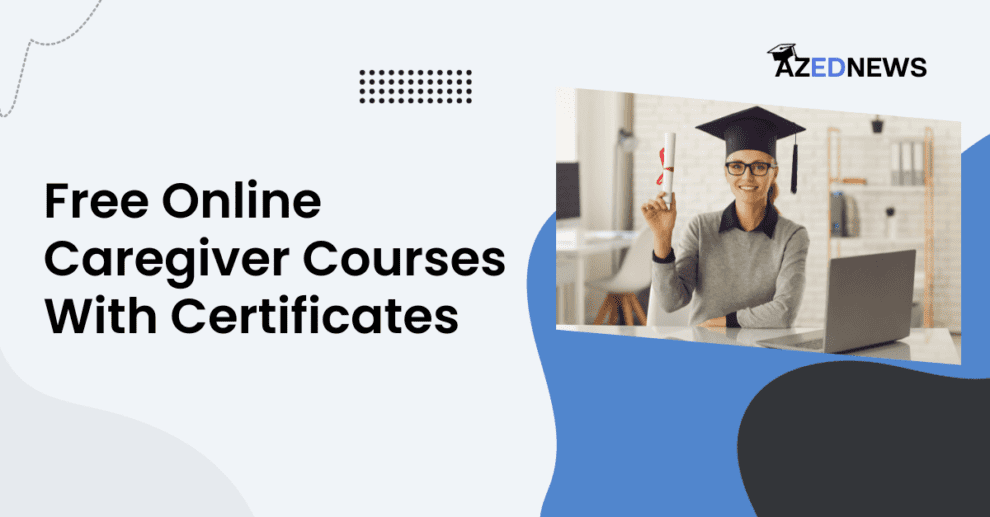



Add Comment